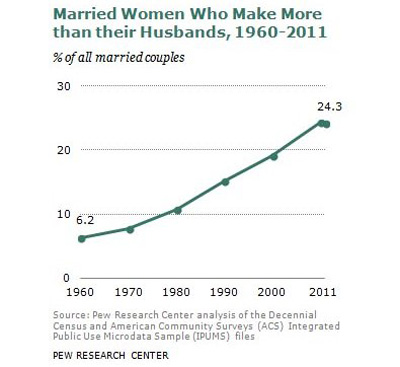Do better jobs lead more wives to cheat?
A new study says the percentage of wives having affairs is up 40 percent

A free daily email with the biggest news stories of the day – and the best features from TheWeek.com
You are now subscribed
Your newsletter sign-up was successful
Though wage equality between men and women remains stubbornly elusive, the gap has slowly been narrowing over the years. In 1980, women made about 60 cents to every dollar earned by men — by 2010, it was closer to 80 cents.
As the wage gap contracts at work, the cheating gap — the number of husbands who admit to cheating compared to the number of wives — is starting to close at home. And not because men are doing less of it.
The latest National Opinion Research Center's General Social Survey shows that the percentage of wives who admit to having affairs rose to 14.7 percent between 1990 and 2010, an almost 40 percent increase from the previous decade. Meanwhile, the number of men reporting affairs remained consistent at 21 percent. Bloomberg Businessweek takes a stab at why women are catching up:
The Week
Escape your echo chamber. Get the facts behind the news, plus analysis from multiple perspectives.

Sign up for The Week's Free Newsletters
From our morning news briefing to a weekly Good News Newsletter, get the best of The Week delivered directly to your inbox.
From our morning news briefing to a weekly Good News Newsletter, get the best of The Week delivered directly to your inbox.
More women may feel free to cheat because the economic consequences aren't as dire as they were when more women stayed at home, said Pepper Schwartz, a University of Washington sociologist.
"They can afford the potential consequences of an affair, with higher incomes and more job prospects," she said in an email. "They have more economic independence and may meet a better class of mate." [Bloomberg Businessweek]
It's true that more U.S. women are family breadwinners than ever before. In four in ten American households with children under eighteen, the wife is the primary breadwinner, according to a recent Pew study, a sharp increase from 1960:

But here's where it gets depressing for the ladies: One might assume that if financial dependence makes women cheat less, and more men than ever are financially dependent on their wives, it would add up to fewer cheating husbands.
This doesn't appear to be the case. Not only are husbands holding on to their 21 percent cheating rate, but a separate study from 2010 presented to the American Sociological Association showed that the more economically dependent a man is on his female partner, the more likely he is to cheat on her. The same study also showed that men are more likely to have affairs when they make vastly more than their wives.
Christin Munsch, who authored that study, said, "At one end of the spectrum, making less money than a female partner may threaten men's gender identity by calling into question the traditional notion of men as breadwinners."
A free daily email with the biggest news stories of the day – and the best features from TheWeek.com
Meanwhile, he said, "At the other end of the spectrum, men who make a lot more money than their partners may be in jobs that offer more opportunities for cheating like long work hours, travel, and higher incomes that make cheating easier to conceal."
So what does all of this add up to? Some hand-wringing, but not many firm conclusions. Plenty of other factors could be playing into more women reporting affairs. The NORC study suggests that social media, which makes meeting potential paramours easier than ever, could also be contributing to the change. Evolving attitudes toward female sexuality may be a factor as well.
Carmel Lobello is the business editor at TheWeek.com. Previously, she was an editor at DeathandTaxesMag.com.